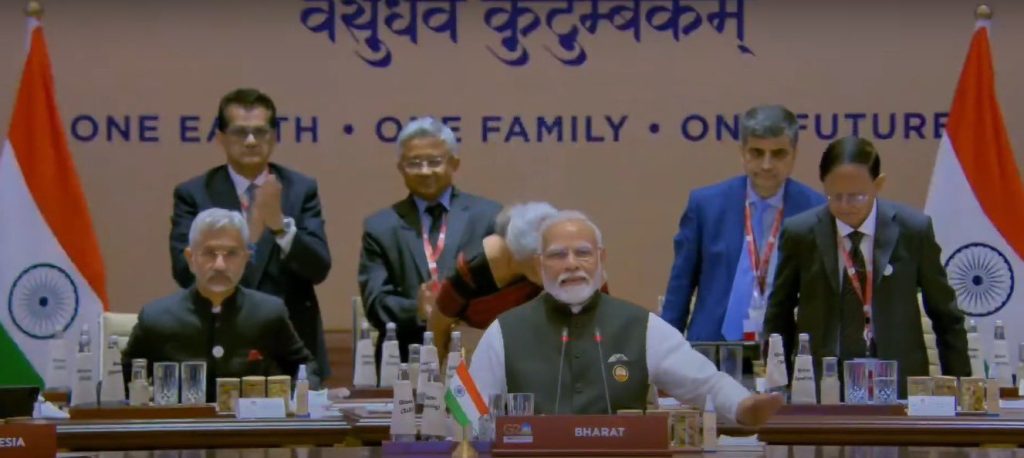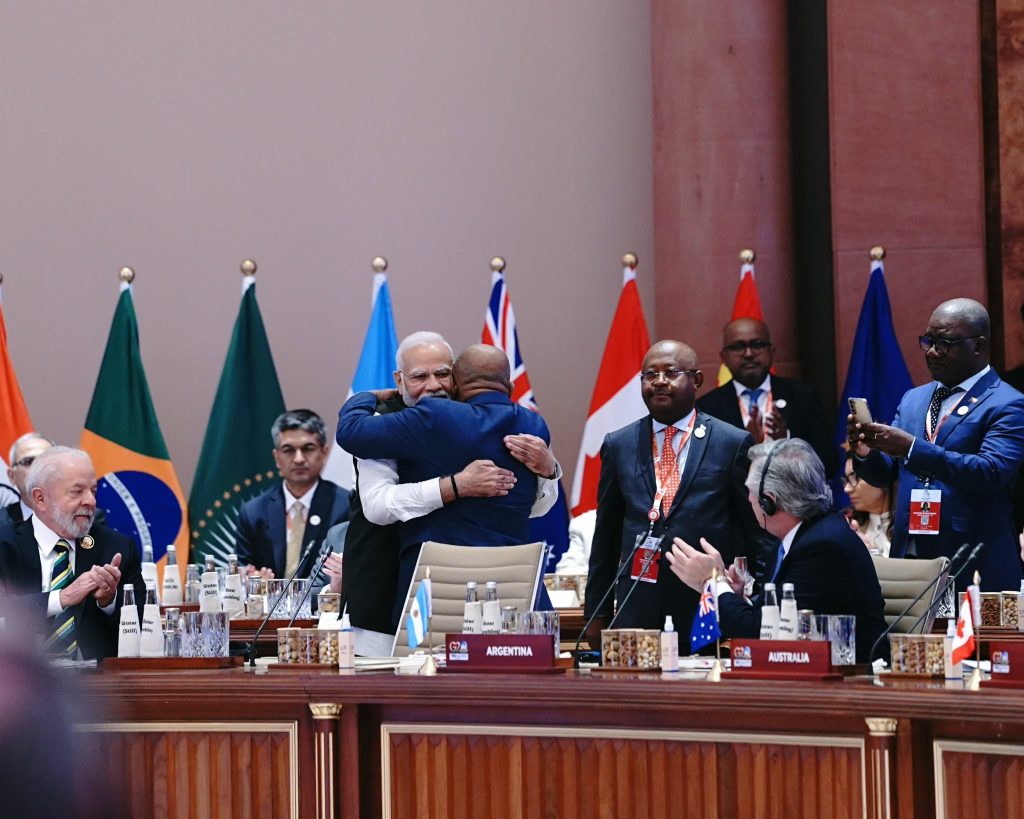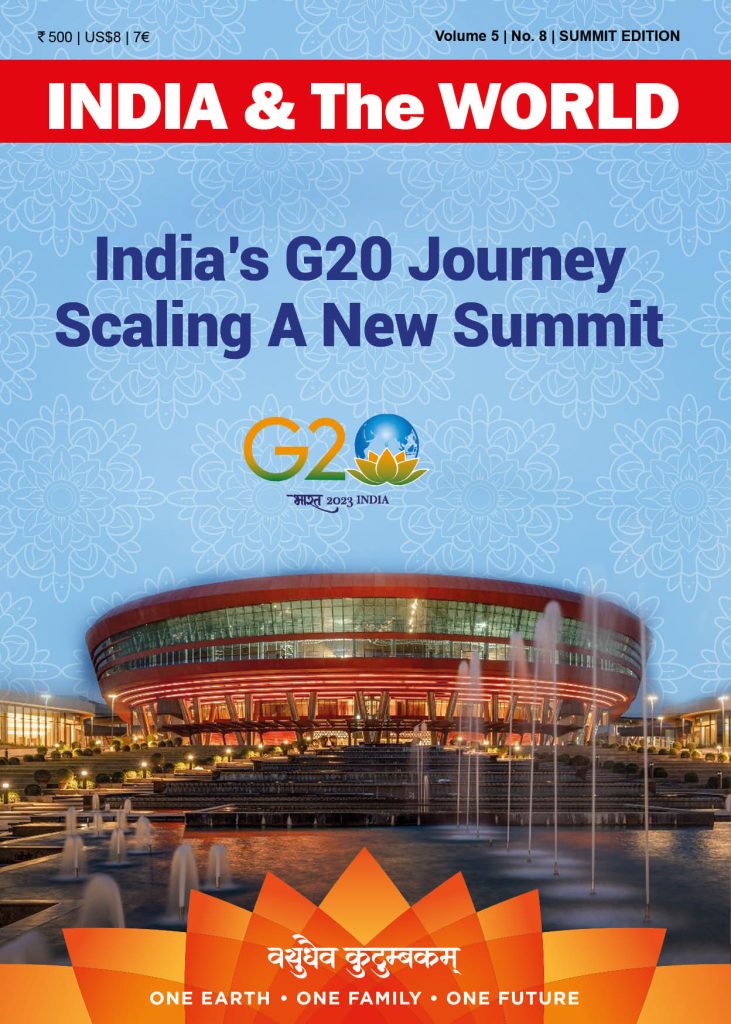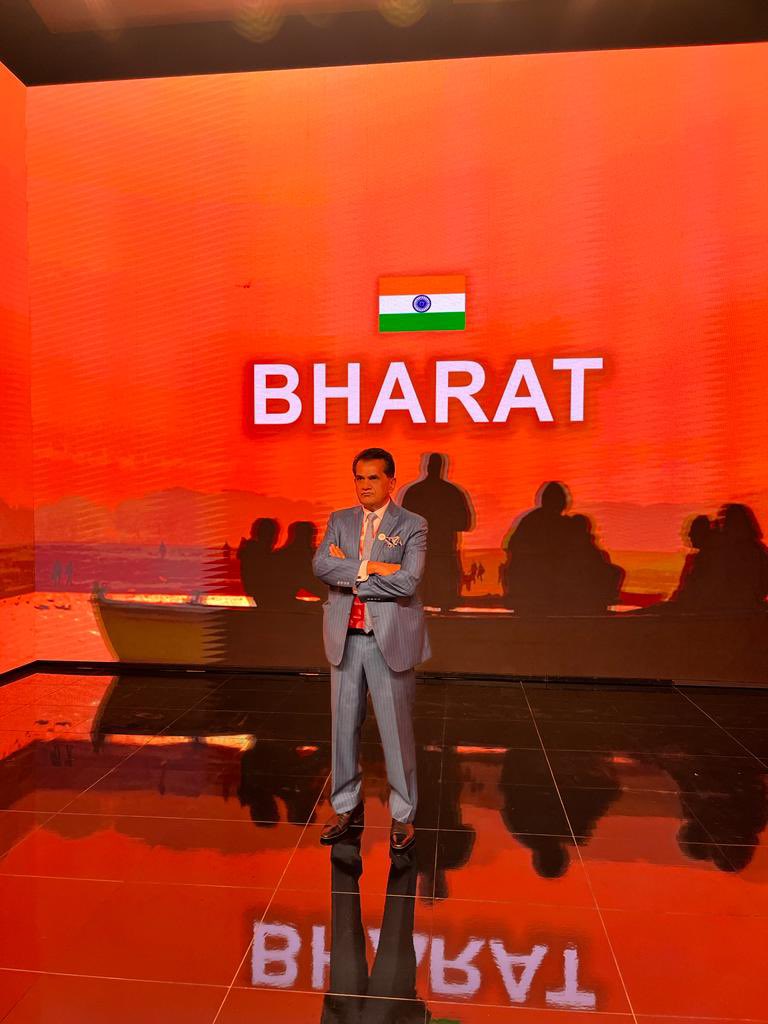By Amitabh Kant
India’s G20 Presidency focuses on inclusivity, innovation, and sustainability. With transformative initiatives spanning growth, SDGs, green development, gender equality, and more, India solidifies its global role, emphasising collective action for positive change. The New Delhi Summit marks a central moment, reflecting India’s commitment to shaping a brighter, equitable future, says India’s G20 Sherpa Amitabh Kant.
As the countdown to the final G20 Leaders’ Summit in September begins, India’s presidency stands as a testament to Prime Minister Narendra Modi’s vision of inclusivity, ambition, and decisive action. Guided by these principles, India has embarked on a journey to negotiate and establish transformative, action-oriented initiatives that potentially reshape the global landscape. These priorities have been selected to reflect India’s commitment to fostering a more equitable and sustainable world – now more pertinent than ever in the context of multiple health, climate, and geopolitical crises.
Strong, Sustainable, Balanced and Inclusive Growth

India’s G20 Presidency is committed to fostering growth that goes beyond economic prosperity to encompass inclusivity and resilience. In a country where the middle-class segment is projected to expand to a billion people by 2046-47, the emphasis on manufacturing and strategic urbanisation is pivotal to achieve a growth rate of 9%-10% per annum. This ambitious drive aligns with India’s vision to become a leader in shaping the global agenda.
However, our approach to growth must be multifaceted. The creation of smart cities must go hand in hand with advocating for policies that are environmentally sustainable and that also ensure decent work opportunities in the era of technological transformation – promoting upskilling and reskilling initiatives to adapt to evolving job landscapes. Furthermore, as we commit to enhancing the ease of doing business, both domestically and abroad, streamlining regulations must combine with investments in improving infrastructure to create an enabling environment for businesses to flourish.
Accelerating Progress on Sustainable Development Goals (SDGs)
The theme of Vasudhaiva Kutumbakam or One Earth-One Family-One Future under India’s G20 Presidency highlights the crucial midpoint in the implementation of the 2030 agenda. This presidency offers a unique platform to reflect on the progress, impact, and future direction of the G20 to expedite the 2030 Agenda. While the pandemic, climate change, and other crises have impeded progress on SDGs, setting back decades of advancement, India’s emphasis on collective action, blended financing, and leveraging private capital underscores the need for innovative and cross-cutting solutions to revitalise global efforts on this front.
The ‘G20 2023 Action Plan on Accelerating Progress on the SDGs’ was unanimously adopted by all G20 member countries during the Development Ministers’ Meeting in Varanasi in June. This plan strategically focuses on transformative areas such as digital transformation, gender equality, and sustainable transitions to accelerate the realisation of SDGs worldwide. As a dynamic multi-year document, it enhances collaboration among G20 workstreams and fosters international partnerships to advance SDGs globally. The Development Working Group (DWG) will oversee its implementation, reinforcing the G20’s commitment to inclusive and impactful progress.
Green Development Pact for a Sustainable Future
India’s dedication to a sustainable future takes shape through the G20 Green Development Pact – a Leaders’ deliverable that propels collaborative efforts for sustainable development, climate action, and environmental initiatives on a global scale, interconnected and mutually reinforcing. This transformative initiative seeks to strike a balance between economic advancement and environmental conservation. By leveraging green technologies, reducing carbon emissions, and promoting sustainable practices, India’s commitment paves the way for a blueprint that can guide nations in achieving ecological harmony.
Multilateral institutions for 21st Century
Central to India’s agenda is the transformation of Multilateral Development Banks (MDBs) such as the World Bank and IMF. These institutions, shaped after World War II, must now reflect the 21st-century realities. India’s Prime Minister Narendra Modi and US President Joe Biden have emphasised the urgency of modernisation, including the incorporation of transboundary issues and climate action. With MDB reforms gaining momentum, the G20 Troika held by developing nations promises a pivotal opportunity for progress.
Moreover, acknowledging the limitations of government finances, innovative financing strategies are being explored to bolster smaller nations. These strategies involve attracting private capital through incentives, reducing investment risks, and leveraging avenues like blended financing and sovereign green bonds. By tripling sustainable lending by 2030, optimising capital usage, and enhancing collaboration with the private sector, India’s leadership envisions a robust multilateral framework that catalyses global economic resurgence and accelerates SDG achievement.
Technological Transformation and Digital Infrastructure
Acknowledging the transformative power of technology, India’s presidency places immense importance on harnessing its potential for the greater good. Through the development of a robust digital public infrastructure (DPI), India has successfully democratised access to essential services, fostering digital inclusion for underserved sections, plugging leaks in Direct Benefit Transfer (DBTs), and creating pathways for the ethical use of public data and IP for advanced innovation.
This presents an opportunity for the G20 to establish channels for sharing knowledge, best practices, financing, and capacity-building aimed at assisting low and middle-income nations in crafting and advancing their own inclusive, interoperable, and secure DPI.
Gender Equality and Empowering Women and Girls
India’s draft New Delhi Declaration is particularly ambitious for its emphasis on women’s empowerment. Notably, the endorsement and widespread support of the dedicated Women’s Working Group, set to convene under Brazil’s G20 Presidency next year, demonstrates a significant stride toward fostering concrete actions for gender equality and the empowerment of women and girls.
This visionary step not only empowers women and girls but also aligns with the G20’s broader mission of achieving inclusive and sustainable development.
By boosting women’s financial access, skills, leadership roles, health, and gathering gender-specific data, we pave the way for a brighter future. India is dedicated to constructing strong digital systems and enacting projects that bridge gender disparities, empowering women and nurturing their leadership. Through these united actions, we forge a path to a thriving future where women’s economic empowerment and gender parity take centrestage in our shared pursuits across sectors and borders.
Championing the Voice of Global South
Inclusivity takes center stage in India’s G20 Presidency. The landmark proposal to include the African Union in the G20 fold reflects India’s dedication to amplifying the voices of emerging countries and those from the Global South.

This year, India has ensured the highest African participation in the G20 to date by including South Africa, Mauritius, Egypt, Nigeria, AU Chair – Comoros, and AUDA-NEPAD as invitees to the forum. In January, India hosted a special virtual summit called the Voice of the Global South Summit under the theme – ‘Unity of Voice, Unity of Purpose,’ which witnessed the participation of 125 countries and 18 heads of state. This commitment to diverse perspectives exemplifies India’s role as a bridge-builder throughout history, enhancing the forum’s equitable representation.
Cultural Programmes: A Tapestry of India’s Diversity
India’s vibrant cultural heritage has taken center stage during its G20 Presidency, with 150 cultural programmes held so far, showcasing diverse local and national art forms. By featuring 7,000 artists across these programmes, we have not only managed to provide a post-COVID impetus to the tourism sector but have also offered a global platform for indigenous artists to showcase their work, fostering cross-cultural understanding between countries.
Initiatives and Achievements: Shaping the Future
Under India’s visionary leadership, an array of new initiatives has been introduced, exemplifying the nation’s commitment to shaping a dynamic global landscape. Notably, a new Disaster Risk Reduction Working Group has been established within the Sherpa track, signifying India’s proactive approach to confronting critical challenges head-on.
Furthermore, the formalisation of the Women’s Working Group during India’s Presidency speaks volumes about the country’s dedication to gender equality and empowerment. With its inaugural meeting scheduled for the Brazilian Presidency, this initiative holds the promise of fostering meaningful change and amplifying the voices of women across the G20 forum. These endeavours, coupled with the elevation of the G20 Research and Innovation Initiative Gathering (RIIG) into a comprehensive Working Group during the Ministerial meeting in Mumbai, reflect India’s commitment to innovation-driven progress. This forward-thinking move underscores our aspiration to harness collective creativity for sustainable solutions, setting the stage for future collaboration under the Brazilian Presidency in 2024.
Reaching Across Borders
India’s G20 Presidency has transcended geographical boundaries by welcoming over 20,000 delegates from 115+ nationalities across multiple venues to date. This widespread outreach has nurtured international collaboration, enriching the G20’s discourse with an array of diverse perspectives that reflect the intricacies of our interconnected world.
The New Delhi Summit: A Confluence of Leaders
India’s hosting of a record-breaking 43 heads of state at the New Delhi summit solidifies its role as a central player on the global stage. This unparalleled participation reaffirms the significance of India’s presidency and its far-reaching impact on the G20’s agenda.
As India’s G20 Presidency approaches its culmination, the nation’s steadfast commitment to inclusivity, ambition, and decisive action stands undiminished. Guided by Prime Minister Narendra Modi’s visionary leadership, India’s transformative initiatives are poised to shape a more sustainable and equitable future for all. By amplifying the voices of the Global South and embracing diverse perspectives, India has reaffirmed the G20’s pivotal role as a catalyst for collective action and positive change. As the world eagerly awaits the New Delhi summit, it anticipates the crowning moment of a presidency that will leave an enduring mark on the global stage.
(Amitabh Kant is India’s G20 Sherpa. He was CEO, NITI Aayog (National Institution for Transforming India), India’s premier policy think tank. Prior to that, Kant, an Indian Administrative Service officer, served as Secretary, Department of Industrial Policy & Promotion. He is the author of Branding India – An Incredible Story, Incredible India 2.0 and has edited The Path Ahead: Transformative Ideas for India. He has been a key driver of the “Make in India”, “Startup India,” “Incredible India” and “God’s Own Country” initiatives which positioned and branded India and Kerala as the leading manufacturing and tourism destinations.)

This article is included in the Summit Edition of India and the World magazine-journal, focused on India’s G20 presidency. It has been published to mark the September 9-10 G20 summit in New Delhi. To subcribe or buy, write to: in**************@***il.com
Amitabh Kant
Author Profile
- India Writes Network (www.indiawrites.org) is an emerging think tank and a media-publishing company focused on international affairs & the India Story. Centre for Global India Insights is the research arm of India Writes Network. To subscribe to India and the World, write to editor@indiawrites.org. A venture of TGII Media Private Limited, a leading media, publishing and consultancy company, IWN has carved a niche for balanced and exhaustive reporting and analysis of international affairs. Eminent personalities, politicians, diplomats, authors, strategy gurus and news-makers have contributed to India Writes Network, as also “India and the World,” a magazine focused on global affairs.
Latest entries
 DiplomacyJanuary 5, 2026India walks diplomatic tightrope over US operation in Venezuela
DiplomacyJanuary 5, 2026India walks diplomatic tightrope over US operation in Venezuela India and the WorldNovember 26, 2025G20@20: Africa’s Moment – The Once and Future World Order
India and the WorldNovember 26, 2025G20@20: Africa’s Moment – The Once and Future World Order DiplomacyOctober 4, 2025UNGA Resolution 2758 Must Not Be Distorted, One-China Principle Brooks No Challenge
DiplomacyOctober 4, 2025UNGA Resolution 2758 Must Not Be Distorted, One-China Principle Brooks No Challenge India and the WorldJuly 26, 2025MPs, diplomats laud Operation Sindoor, call for national unity to combat Pakistan-sponsored terror
India and the WorldJuly 26, 2025MPs, diplomats laud Operation Sindoor, call for national unity to combat Pakistan-sponsored terror








